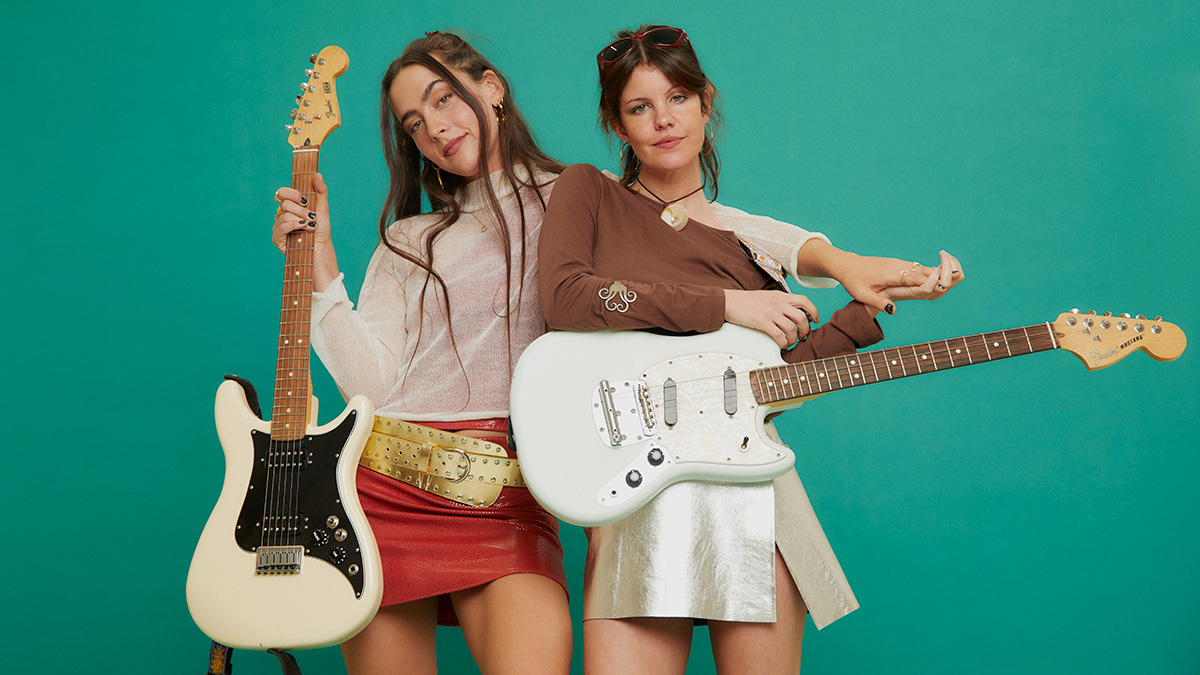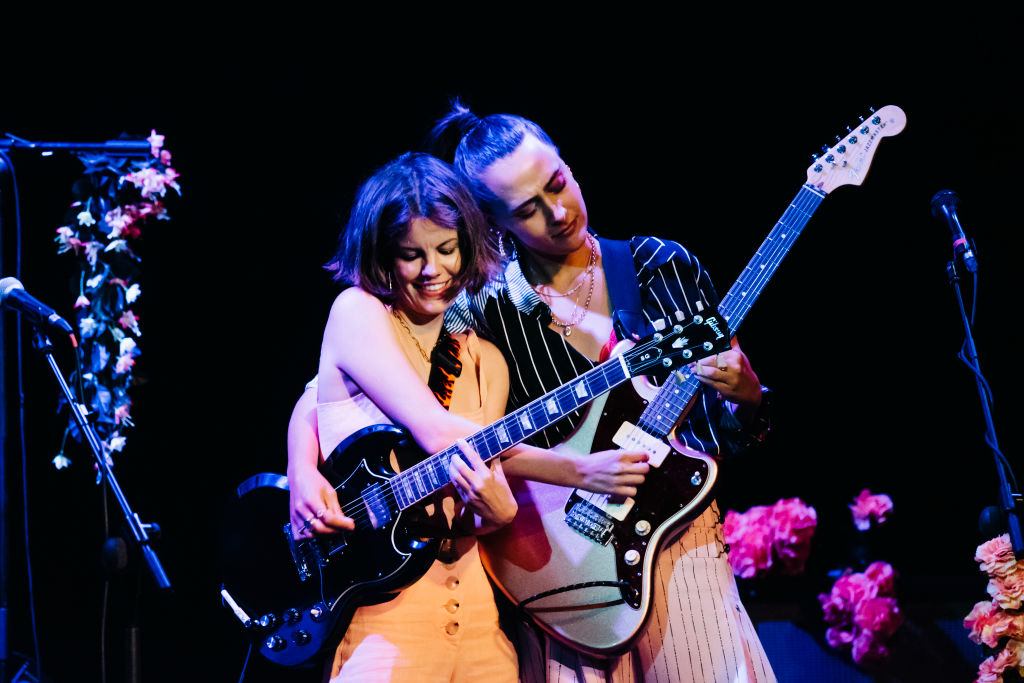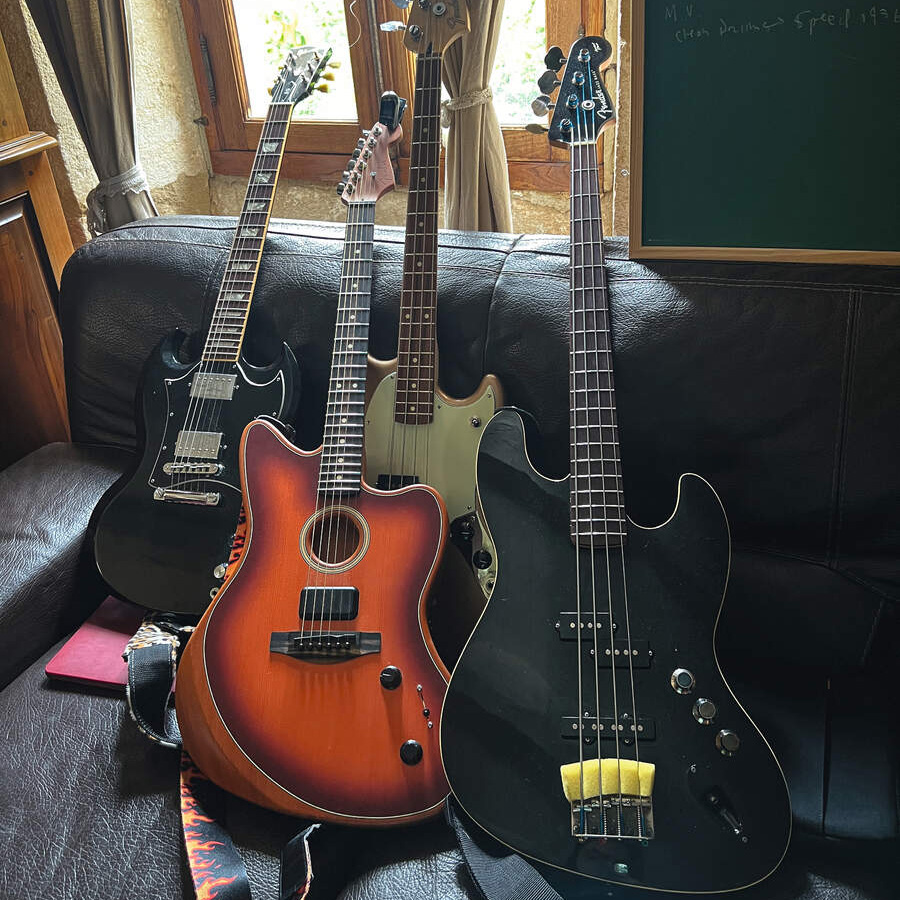
Spanish indie rockers Hinds have an ethos best encapsulated by a phrase from their home country: “No dejes para mañana lo que puedes hacer hoy,” or “better now than later.”
The lilting exuberance of their first singles, Bamboo and Trippy Gum, which intoxicated the indie world and sustained their career over three albums, still comes across the screen as co-founders Carlotta Cosials and Ana Perrote dial in from Madrid, clutching coffees and finishing each other's sentences.
However, it's now coupled with a passion, creative determination, and an “against all odds” conviction that contrasts the nonchalant, off-the-cuff delivery – and isn't that exactly what we want from our guitar heroes?
Their new (and fourth) album, Viva Hinds is a hard-earned statement of grit, heartbreak, and healing that caps a fraught few years for the group. In 2023, just as Hinds were getting on their feet after the pandemic, drummer Amber Grimbergen and bassist Ade Martín announced they were leaving the band.
“It was one thing after the other,” admits Perrote. “As soon as it happened, I remember just having a meeting, which is what we do every day, which is just meeting for coffee.
“And just being like, ‘Okay, this is happening. We need to protect our energy and the will because we have finally found the excitement to make a new album. We don’t want to wait for a record deal or manager and all of those things that were a bit shaky.”
“We were finally there, regardless of everything, so it was like, ‘Okay, the thing we need to protect the most is that feeling that we have, so we just need to carry on,’” she adds, as Cosials nods in agreement.

You previously mentioned that you both started playing guitar while on holiday together. Is that true?
Cosials: “I'll never let the truth ruin a good story! No, that's true. It wasn't the first time that I picked up a guitar, but I think I only knew three chords. We learned how to properly play guitar while creating the band. So we completely developed our guitar skills on stage.”
So did you decide to start a band while on that trip?
Perrote: “We fell in love with it [the guitar] instantly. Like CC was saying, we obviously loved music. And it was one of the things that bonded us. We met through ex-boyfriends. Actually, my ex-boyfriend and her ex-boyfriend had a band together, and we would go to their rehearsals and cheer them on.
“So it wasn't until I broke up with him that we decided to do this trip. We decided, ‘Should we just bring the guitar?’ Yeah, whatever. It was one of those very casual trips. We were staying in a hostel that had many beds but we were lucky enough that it was only the two of us.
“I remember CC was showering, and I was finding these chords for a Bob Dylan song. And we started sort of teaching each other and rehearsing it, and we're like, ‘Oh, what if we sing it, but you sing this part and I sing this part?’ and just instantly, we were addicted to the feeling of playing together. And during those days, we didn't do anything else.”
Cosials: “Even the sunburn that we got from the beach. It was in the shape of the guitar!”
Perrote: “That's when we realized that we loved it so much. We were like, ‘Should we turn it into a band? Should we try to play one show before the end of the year?’”
What did the guitar give you that other instruments didn't?
Cosials: “I just love it. When we first got into a rehearsal space, there were some drums, and we weren't sure if we were going to keep the band acoustic or what the hell we were going to do. But I told Ana, ‘I'm so sorry, I’m no good at drums. I still prefer the guitar.’”
Perrote: “Even when we decided to go electric, one should have gone to bass. But we both were like, ‘I just don't want to do it.’”
Cosials: “Probably there's a little bit of personality attached to all instruments. If you're a guitar player, even if you try to fight against it, it's very difficult to change your core.”
Probably there's a little bit of personality attached to all instruments. If you're a guitar player, even if you try to fight against it, it's very difficult to change your core
When you released your first singles, there was a lot of talk about the fact that your success was “instant”. Did this pressure force you to develop your sound quickly? Or did you have an idea of what you wanted to sound like from the start?
Cosials: “In the beginning, when everything started to move really fast for the natural growth of a band, we were like, ‘We should protect what we are right now. We shouldn't change as fast as the outside world is moving.’ When you get attention with only two songs out, it's very dangerous to start listening to what people want. You need to make a lot more music and create to your own taste.”
When you got into the studio for Viva Hinds, did you just record everything between the two of you?
Perrote: “It was actually really cool because, if you're in a band, [you’ve got] four people, a lot of opinions, a lot of egos. It's sometimes tough for everyone to be happy [with an album]. So it was refreshing to have that space to decide everything for the song, rather than the instrumental part. It was challenging, but it wasn't too hard.
“Our producer, Pete Robertson [The Vaccines], is an amazing drummer, so we did it between the three of us. That's the bit that changed the most: we had to work more. I remember we were saying, ‘Fuck me, I can't even have a break.’ Because if we weren't recording, he's playing the drums, and we're obviously directing him. It was a lot more work than usual!”

I've always noticed that your guitar parts complement each other. Was this always something you took into consideration while songwriting?
Cosials: “Yeah, one hundred percent. It's like that because we want to have a good conversation [between the guitars]. In this album, we introduced the same [element] with the keys.”
So Ana, you're known for using Jazzmasters while Carlotta, you've mostly used Danelectros and Gibson SGs. What drew you to these guitars, as opposed to say, Strats or Les Pauls?
Perrote: “One of the main reasons is how comfortable it is. I remember the first time we were in a studio. We won a contest and had a day in a studio in Berlin. And I remember trying a Telecaster, especially for solos and stuff.
“I was doing the solos for Castigadas En El Granero, and finding the sliding so complicated, like a fucking mountain between one fret and the other and I absolutely hated it. That's kind of the reason why I stuck with Jazzmasters.
“But for this album, we used other guitars, and now, for live, I'm going with a new one. It's a Fender Meteora. So that's exciting!”
Cosials: “I chose Danelectro because I wanted to copy my heroes. And my heroes at that time were all these California wave [guitarists]. You start by copying what you see with your eyes, so that was the main reason. I didn't test it out, or anything like that. Then I changed to a very common guitar, the [Gibson] SG, and it's a fucking monster. It just rages. I think it fits me very well.”
Are these the guitars you also used on this album?
Perrote: “We used the [Fender] Acoustasonic Jazzmaster lot. And also Pete's one, a Fano Alt De Facto SP6 [a kind of Les Paul/Telecaster hybrid]. CC's guitar [the Gibson SG] was more for solos, and then for this [the Fano guitar], we used it to create a lot of layers doing what we call “cowboy guitars”, which is like, what would have been a bass, but it's really like a guitar [layer] on top of the bass. For bass, we had a Mustang that we own and a black [Fender] Aerodyne Jazz bass.”
This year, you released En Forma, your first single that's fully in Spanish. Are there any Spanish-inspired elements in your guitar playing at all?
Cosials: “I don't know what my roots are, to be honest. The language is definitely something very, very big, but I wouldn't say that I have a [Spanish] sound or guitar style that I could actually go back to.”
Perrote: “In some of them, there's a nylon Spanish guitar in the background. But that's about it.”
You collaborated with Beck on the single Boom Boom Back. Did he play guitar as well?
Perrote: “No! So for us, he just appeared and we felt like we were his session musicians, his band. He appears, sings, and then he leaves. You know, the song was already done.”
So it was already called Boom Boom Back before you knew whether he was actually going to sing on it?
Perrote: “Can you believe it?! Sí. Also, our goal with this album was not to wait or rely on anyone else. Even though he had said, ‘Yeah, I want to sing,’ we were ready for him to not sing. So we went ahead and recorded everything prior.”
Beck just appeared and we felt like we were his session musicians, his band. He appears, sings, and then he leaves
Hinds are known for opposing perfection and the pressure to sound or be “perfect”. Do you think that's still a value that defines you, and the band?
Perrote: “It's important to let, especially women, be natural. Life, and being natural, is [all about] fucking up. And especially a band like us. We're very punk. We're very hands-on. We don't have all of those things that you see that make a show perfect.
“So we should be allowed to be free and decide that if we want to be yelling, it's because we want to be yelling. It's not a mistake. It's just a decision. There aren’t many examples of natural women in the music industry, I think, in any sense.”
Cosials: “When you think about a female artist, it's easier to go to a mainstream artist, and joder, that's a league that we cannot compete with. We spend our time in the rehearsal place, loading in and loading out. You end up wearing a T-shirt and something comfortable because of the job, because of the instrument that I play and the kind of show that I want to give.”
What have been the highlights of your career so far?
Cosials: “We've been to Japan three or four times, and that was super-cool.”
Perrote: “I'm also really proud of the fact that we are the first-ever Spanish band to have an international career. Like, you know, when we go to London, we have British people, and when we go to New York, it's American people. No one has done it before, which is crazy.”
Cosials: “We used to be huge fans of this band that doesn't exist anymore. They were called The Virgins. But we met the guitar player and drummer on our very first tour in America. And we had this night that, for the very first time, we felt admired. They kept asking us to play more songs.
“It's not like you need confirmation, but having it from people whose music you admired when you were a teenager hits differently. It gave us the strength for maybe a couple of years.”
What advice would you give to someone who wants to start a band, but feels like they’re not good enough, or maybe haven’t even started playing an instrument?
Perrote: “If we had waited, we would probably be a completely different band with a less fun career. We are proof that waiting is for people who are scared.
“If you can, find a good friend and stick with them. And you know, when you are scared, let that person be the strong person and just lean on each other. Because having someone next to you is what makes this the most enjoyable thing.”
- Viva Hinds is out now.







